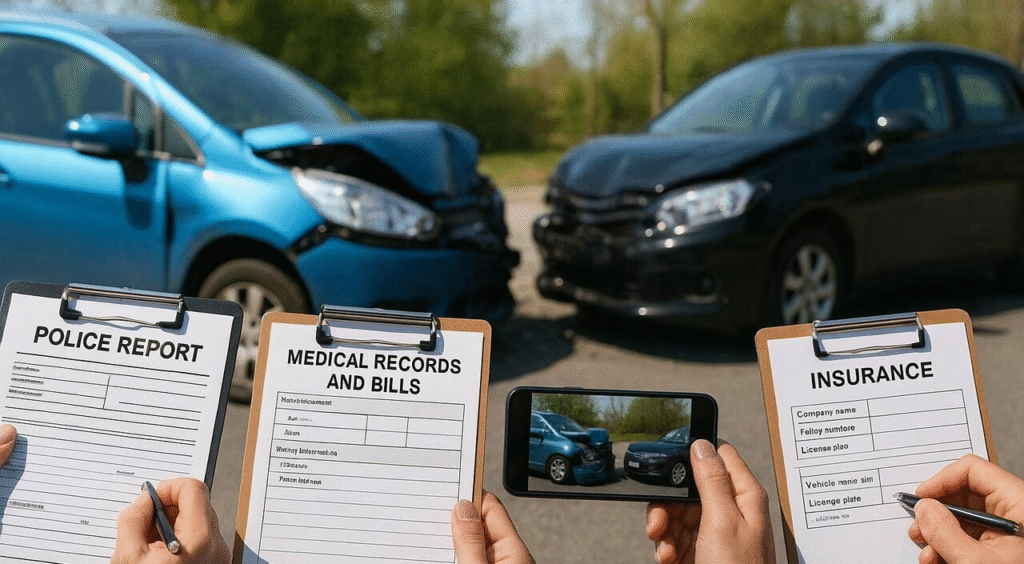If you’ve been in a car accident that wasn’t your fault, gathering the right evidence is essential to protect your rights. A car accident lawyer can help you collect and present strong evidence to prove liability and fight for the compensation you deserve, including medical expenses, lost wages, and pain and suffering. Here’s a breakdown of the essential evidence you should collect at the scene and afterward.
Stay Calm and Prioritize Safety
In the immediate aftermath of a car accident, staying calm and making safety your priority is essential. If it’s safe, pull your vehicle to the side of the road and check for any injuries to yourself or others. Call 911 to report the accident, even if there appear to be no serious injuries.
Police officers and emergency responders will assess the situation, provide medical assistance, and document the crash. A police report can serve as a valuable piece of evidence in any insurance or legal claims.
Exchange Information with the Other Driver
After checking for injuries and calling authorities, exchange essential information with the other driver:
- Full name and contact details
- Insurance company and policy number
- Driver’s license and vehicle registration number
- Make, model, and color of the vehicles involved
Avoid discussing faults or making accusatory statements. Stick to the facts and let the police and insurance investigators determine liability.
Document the Accident Scene
Evidence collected at the scene can greatly impact the outcome of your claim. Document the scene with photos and videos using your phone or camera, including:
- Vehicle damage from different angles
- Skid marks, traffic signals, road signs, and debris
- Visible injuries (if any)
- Weather or road conditions
Additionally, gather contact information from any witnesses and ask for brief statements about what they saw.
Cooperate with Law Enforcement
When officers arrive, explain what happened from your point of view. Be honest, clear, and concise. If possible, ask for a copy of the police report or instructions on how to obtain it later. Avoid making assumptions or speculating about what the other driver did.
Important Actions to Take Following an Accident
The days after a car accident are critical to both your recovery and your claim process. Following the right steps can make a significant difference in protecting your rights.
Seek Prompt Medical Care
Even if you felt fine at the scene, some injuries may become apparent later. Visit a doctor within 72 hours to ensure your injuries are evaluated and documented. A medical report serves as vital evidence in proving that your injuries were caused by the crash.
If your accident occurred while driving for work, notify your employer and explore whether you’re eligible for workers’ compensation.
Notify Your Insurance Company
Report the accident to your insurance company as soon as possible, ideally within 24 hours. Provide accurate information, but avoid admitting fault. Your insurer will guide you through the claims process, especially if you live in a no-fault state or the other driver is uninsured.
Timely reporting also helps avoid potential denial of coverage due to missed deadlines outlined in your policy.
File a Third-Party Claim with the At-Fault Driver’s Insurer
If the other driver caused the accident, you have the right to file a claim with their insurance provider. Include all relevant documentation, such as:
- Police report
- Medical records
- Photos or videos from the scene
- Repair estimates or receipts
You may be offered a settlement to cover your damages. If the offer seems too low, you can negotiate or consult with a lawyer.
Understanding Fault in Car Accidents
Determining who is responsible for a car accident affects how compensation is awarded. States follow different systems:
No-Fault States
In these states, your insurer typically covers medical expenses and other losses, regardless of who caused the accident.
Fault States
Fault is determined based on evidence, and the at-fault party is held responsible for damages. Two common models include:
- Pure Comparative Negligence: You can recover damages even if you’re partially at fault, though the amount is reduced by your fault percentage.
- Modified Comparative Negligence: You must be less than 50% at fault to receive compensation. If you are 50% or more responsible, you may not recover any damages.
When to Contact a Car Accident Lawyer
While some minor accidents can be handled without legal help, certain circumstances call for professional guidance. Consider hiring an attorney if:
- You’re seriously injured or facing long-term treatment
- The fault is disputed between the parties
- The insurance company offers a low settlement
- The other party is uninsured or underinsured
An experienced car accident attorney can negotiate on your behalf, gather expert testimony, and file a lawsuit if needed to ensure fair compensation.
Let Abogada Kim Bruno Protect Your Rights After an Accident
Collecting the right evidence after a car accident is essential, but it’s only the first step. If you’ve been injured in a crash that wasn’t your fault, navigating the insurance process and proving liability can quickly become overwhelming. That’s where Abogada Kim Bruno comes in.
Our experienced legal team is dedicated to helping accident victims across Texas secure the justice and compensation they deserve. From gathering strong evidence to handling aggressive insurance companies, we’ll take care of the legal process so you can focus on healing.
